- Clone
- P84F5 (See other available formats)
- Regulatory Status
- RUO
- Other Names
- GATA Binding Protein 1, Erythroid Transcription Factor, Globin Transcription Factor 1, NFE1, XLTT
- Isotype
- Mouse IgG2b, κ
- Ave. Rating
- Submit a Review
- Product Citations
- publications
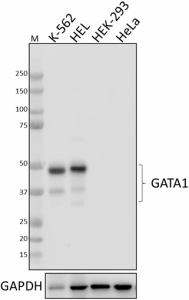
-

Whole cell extracts (15 µg total protein) from K-562 and HEL (positive controls), and HEK-293 and HeLa (negative controls) cells were resolved by 4-12% Bis-Tris gel electrophoresis, transferred to a PVDF membrane, and probed with 0.25 µg/mL (1:2000 dilution) of purified anti-GATA1 antibody (clone P84F5) overnight at 4°C. Proteins were visualized by chemiluminescence detection using HRP goat anti-mouse IgG antibody (Cat. No. 405306) at a 1:3000 dilution. Direct-Blot™ HRP anti-GAPDH antibody (Cat. No. 607904) was used as a loading control at a 1:25000 dilution (lower). Lane M: Molecular weight marker. -

HeLa (negative control, panel A) and HEL (positive control, panel B) cells were fixed with 4% paraformaldehyde for 10 minutes, permeabilized with 0.5% Triton X-100 for 10 minutes, and blocked with 5% FBS for 60 minutes. Cells were then intracellularly stained with 2.0 µg/mL (1:250 dilution) of purified anti-GATA1 antibody (clone P84F5) overnight at 4°C, followed by incubation with Alexa Fluor® 594 goat anti-mouse IgG antibody (Cat. No. 405326) at 2.0 µg/mL. Nuclei were counterstained with DAPI, and the image was captured with a 60X objective. -

Whole cell extracts (250 µg total protein) prepared from HEL cells were immunoprecipitated overnight with 2.5 µg of purified mouse IgG2b, κ isotype ctrl antibody (Cat. No. 400302) or purified anti-GATA1 antibody (clone P84F5). The resulting IP fractions, whole cell extract input (6%), and post-IP supernatants (Sup) were resolved by 4-12% Bis-Tris gel electrophoresis, transferred to a PVDF membrane, and probed with clone P84F5. Lane M: Molecular weight marker. -

HEL cells (filled histogram, positive control) or HeLa cells (open histogram, negative control) were fixed and permeabilized using the True-Nuclear™ Transcription Factor Buffer set (Cat. No. 424401), and intracellularly stained with purified anti-GATA1 antibody (clone P84F5) followed by PE goat anti-mouse IgG antibody (Cat. No. 405307).
| Cat # | Size | Price | Quantity Check Availability | Save | ||
|---|---|---|---|---|---|---|
| 939101 | 25 µg | 109€ | ||||
| 939102 | 100 µg | 268€ | ||||
The GATA family of transcription factors is comprised of six members characterized by their binding to the consensus DNA sequence (T/A)GATA(A/G). GATA1, which was the initially described member of the GATA family, is predominantly expressed in cells of the myeloid lineage such as erythrocytes, eosinophils, mast cells, and megacaryocytes. Over the course of erythroid differentiation, GATA2 activates expression of the functionally distinct GATA1; promoter-occupied GATA2 is replaced/exchanged at certain promoters with the GATA1 transcription factor, a process known as the GATA switch. Genes induced by GATA1 include HBB, HBG1/2, ALAS2 and HMBS. Haploinsufficient heterozygous GATA1 knockout mice spontaneously develop erythroblastic leukemia, and GATA1-null mice die early in development due to profound anemia.
Product DetailsProduct Details
- Verified Reactivity
- Human
- Antibody Type
- Monoclonal
- Host Species
- Mouse
- Immunogen
- Full-length recombinant human GATA1 protein
- Formulation
- Phosphate-buffered solution, pH 7.2, containing 0.09% sodium azide
- Preparation
- The antibody was purified by affinity chromatography.
- Concentration
- 0.5 mg/mL
- Storage & Handling
- The antibody solution should be stored undiluted between 2°C and 8°C.
- Application
-
WB - Quality tested
ICC, IP, ICFC - Verified - Recommended Usage
-
Each lot of this antibody is quality control tested by western blotting. For western blotting, the suggested use of this reagent is 0.1 - 1.0 µg/mL. For immunocytochemistry, a concentration range of 1.0 - 5.0 μg/mL is recommended. For immunoprecipitation, the suggested use of this reagent is 2.5 µg/test. For intracellular flow cytometric staining, the suggested use of this reagent is ≤ 0.5 µg per million cells in 100 µL volume. It is recommended that the reagent be titrated for optimal performance for each application.
- Application Notes
-
This clone was tested for ICC using 4% PFA-fixed HEL cells permeabilized with either methanol or Triton X-100. While both methods were compatible with robust HEL staining, Triton X-100 permabilization resulted in stronger staining.
When using this clone for ICFC, we recommend using the True-Nuclear™ Transcription Factor Buffer Set or the True Phos perm buffer. We do not recommend using the Intracellular Staining Permeabilization Wash Buffer for ICFC testing due to poor GATA1 staining.
True-Nuclear™ Transcription Factor Buffer Set allowed for better binding to the epitope when compared to the True Phos perm buffer, there was a twofold difference between their median PE readings. - RRID
-
AB_2876765 (BioLegend Cat. No. 939101)
AB_2876765 (BioLegend Cat. No. 939102)
Antigen Details
- Structure
- GATA1 is a 413 amino acid protein with a predicted molecular weight of 43 kD. Additional isoforms of 335 (35 kD) and 330 (34 kD) amino acids have been described.
- Distribution
-
Erythroid and megakaryocytic cells/Nucleus
- Function
- Transcription Factor/Erythroid cell development and differentiation
- Cell Type
- Erythrocytes, Megakaryocytes
- Biology Area
- Cell Biology, Stem Cells, Transcription Factors
- Antigen References
-
- Shimizu R, et al. 2008. Nat Rev Cancer. 8:279-87.
- Bresnick EH, et al. 2010. J Biol Chem. 285:31087-93.
- Katsumura, et al. 2017. Blood. 129:2092-2102.
- Gene ID
- 2623 View all products for this Gene ID
- UniProt
- View information about GATA1 on UniProt.org
Related FAQs
Other Formats
View All GATA1 Reagents Request Custom Conjugation| Description | Clone | Applications |
|---|---|---|
| Purified anti-GATA1 | P84F5 | WB,ICC,IP,ICFC |
| PE anti-GATA1 | P84F5 | ICFC |
| Alexa Fluor® 647 anti-GATA1 | P84F5 | ICFC,ICC |
Customers Also Purchased
Compare Data Across All Formats
This data display is provided for general comparisons between formats.
Your actual data may vary due to variations in samples, target cells, instruments and their settings, staining conditions, and other factors.
If you need assistance with selecting the best format contact our expert technical support team.
-
Purified anti-GATA1
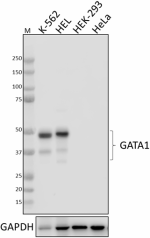
Whole cell extracts (15 µg total protein) from K-562 and HEL... 
HeLa (negative control, panel A) and HEL (positive control, ... 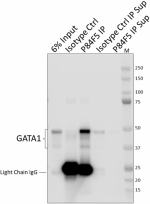
Whole cell extracts (250 µg total protein) prepared from HEL... 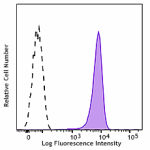
HEL cells (filled histogram, positive control) or HeLa cells... -
PE anti-GATA1

HEL cells (positive control, filled histogram) and HeLa cell... -
Alexa Fluor® 647 anti-GATA1

HEL cells (positive control, filled histogram) and HeLa cell... 
HEL cells were fixed with Fixation Buffer (Cat. No. 420801) ...
 Login / Register
Login / Register 




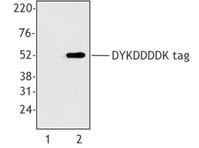
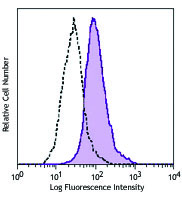

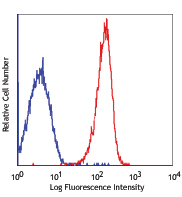



Follow Us